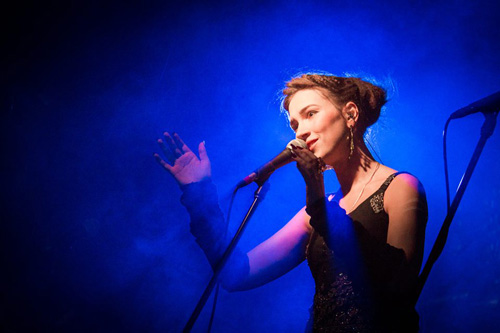For about 4 years Alyona Minulina has been known as Alyona FolkBeat – a beautiful folk singer and beatbox musician from a rising star group FolkBeat. In February 2017 Russian label FireStorm production released their new album “I’m marching on my own” that was recorded and produced by Alyona but at the same time their fans were shocked by news about her leaving the project. Alyona tells us what happened and what’s next.
Q:How did the group FolkBeat get started?
Alyona Minulina: FolkBeat grew up from a student’s ensemble. It was called differently and consisted of a large number of participants. Later I began to study beatbox and electronic music, so I thought it was interesting to combine it with Russian folk songs. So FolkBeat has traditional Slavic polyphony, surrounded by electronic arrangement, which is close to the styles of EDM trap, dubstep, trance and crunk. The compositions are often performed with beatbox – imitation of drum machines and music effects using vocal apparatus and articulation organs.

Q: How would you describe your musical journey so far?
AM: When we started we made music for ourselves and gradually our music started to be interesting to other people. We didn’t think about genres, we were passionate about making music with each other, it was really awesome. When we went on stage the audience felt our special energy.
Q: Did you perform in Europe or only in Russia?
AM: In 2016 Folkbeat took part at EuroRadio Festival and had a concert in Viljandi (Estonia). Besides this we visited Madrid, Munich, Athens and Tallinn with festival of Russian cultural FeelRussia.
Q: As I know – you love collaborating with different music genres and bands: what are the features of Russian folk music that makes it possible for you to collaborate with other musicians?
AM: The most interesting thing for me is the fact that people connect with each other, share cultures, and different genres and traditions mix too. Now I have plans to record some songs together with the master of throat singing Alexei Chichakov from Mountain Altai. This will be the connection of his own Altai traditions and Slavic melodies.
In every collaboration I’m looking for special feeling when the spark runs between musicians (chemistry in our relationship), because then, every performance becomes memorable for listeners. This is the highlight for me. Of course with Folkbeat we often had this feeling. When the head is full with ideas – I always find the way to realize them. But sometimes I get tired and I need to allow some rest for myself. This is the most difficult thing for me.
Q: What music instruments do you use?
AM: Different electronic things (loop station, keyboards), sometimes folk wind instruments like kugikly and kaliuk, khomus.

Q: What can you tell us about the contemporary Russian folk scene?
AM: Despite the fact that the Russian folk scene is a real “folk star” and a budding young musicians, it hasn’t been formed yet. We do not have enough support and solidarity between each other. Although we have more opportunities for advancement than 10 years ago.
Q: How are your albums being received by audiences?
AM: Our first album «Joyful meeting» became favorite Russian-folk album on EBU Folk Festival in 2016. In Russia it was in the top twenty music albums of 2016. This year we released the album «Sama idu» (I’m marching on my own). We collaborated with different electronic musicians and DJs, so it can be classified as pop-folk.
Q: Who would you say are the leading influences in your musical career?
AM: My teachers, who always said something like this: pull yourself and work, work hard, if you really love it.
Q: So what happened to FolkBeat?
AM: With Folkbeat we are friends, but we do not work together anymore. If the world gives us a chance to sing together again, I will take this chance.
Now I work on original songs album with the texts of famous Russian poets from XX century. And together with Jewish, Armenian, Russian musicians and composer from Canada, Ivan Popov, we have created a world music project “Under The Same Sky” which intertwined tunes and melodies of different national cultures. In March we will have a concert of Slavic-Jewish music.

Q: Are Russian audiences, venues, labels and artists open to collaboration?
AM: It depends on various factors, but if you play interesting music, you can always find a way.
Q: Where do you see yourself 10 or 15 years from today?
AM: I see myself chewing pasta in my favorite little pizzeria in Italy, resting in a cozy wooden house on the Solovetsky Islands in Russia, and playing my set at the Burning Man.
Q: Do you also teach workshops for students and musicians?

AM: I opened vocal beatbox and body percussion workshops named “Pulse” in Moscow recently and it’s getting popular. I have a lot of new ideas and projects in my head and I hope my music experience with FolkBeat will help me to create something really unique and internationally interesting.
Videos:
Author: Daryana Antipova
Daryana Antipova has been working as a journalist since 2001 and is involved in radio (Scythian horn program), print (The Moscow News, Russia Beyond the Headlines, Fanograf) and online media related to world music. Drummer in Vedan Kolod folk band, director at Scythian horn agency and label. Her main focus is on traditional folk music, Siberian music and Russian world music in general.


